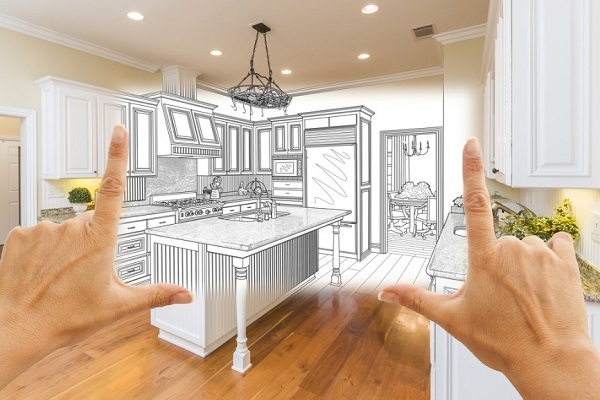So you’re ready to give your home a facelift. From updating a kitchen to making a bathroom more luxurious, a total home renovation can bring new life to a house. Budgeting and choosing finishes are just some of the many decisions you’ll have to make every step of the way.
But where do you begin in this long and complicated process? It’s important to build a team of contractors that you work with well. From carpentry contractors to electricians, you’ll want to build a team of professionals you trust. It’s equally important that you are communicating and cooperating with these contractors throughout the project.
It is important to know what to expect and be prepared for your renovation. Being realistic will make the process less stressful. There are a few things that you should keep in mind and plan for before and during your renovation.
1. Know Your Budget and Timeline
The first and most important step in any home improvement project is setting your budget. Are you paying cash or using a home equity line of credit? Knowing the method and the amount you plan to pay factors into the rest of the project plans.
It’s wise to add a cushion to your budget for unexpected costs. Every project will have things that pop up that are not included in the original budget. This is especially true for a total home renovation.
When dealing with major projects like removing walls and modifying layouts, there are often issues that are uncovered. You don’t want your budget to be blown because a bad pipe or mold was discovered that needs to be addressed. Preparing for this allows you to handle the unexpected while keeping your renovation on track.
It is also important to budget for the lifestyle changes that will happen during your renovation. Will you need to be eating out more while your kitchen is torn up? Will a hotel stay be necessary during a prolonged utility shut-off? Building some room in your budget for these expenses will prevent you from experiencing financial hardship from living with your renovation.
It is also important to set a timeline that is reasonable for your renovation. Be mindful of upcoming events, like holidays and birthdays, that you may want your renovation completed before. Make sure you also build a cushion into your timeline for unexpected delays during your project.
2. Be Realistic and Practical
Once you have set a budget, be realistic with how much can be done. You may not be able to afford the full amount of work that you envision with the amount you are prepared to spend. Scaling down your project may be the only way that you have can quality work done and stay within budget.
Make practical choices with regards to design and layout choices. You may feel that this is your forever home that you are making perfect for your unique family situation. But you don’t want to prevent yourself from being able to sell your home in the future should the need arise. Try to balance your individual wants and tastes with maintaining your resale value.
3. Vet, then Trust Your Contractors
Your contractors make or break the quality of workmanship in your home renovation. Word of mouth is the best way to find quality contractors. Ask around to friends or neighbors that have had projects done for referrals and recommendations. See if they will let you check out their projects for examples of their work. You can also check websites for referrals and reviews of contractors in your area.

Once you narrow down your contractor choices, ask for proof of licensing and insurance. Work together with your contractor to write a detailed contract. Make sure to include clear milestones so they can get paid for their work in a timely manner, and the project can stay on track.
Be proactive and fair with your communication. Your contractor wants to earn your repeat business and future referrals. If you don’t like the way things are going, they will be willing to work together with you to find a solution that works for everyone.
4. Be Realistic with Expectations
Everyone wants to be part of a home improvement show. Unfortunately, most renovations aren’t as glamorous as they seem on TV. It is important to be prepared for how your home life will have to adjust during a renovation.
Take some time before renovation begins to pack up your valuables. This includes any family heirlooms or priceless artifacts. Unfortunately, with workers in and out of your house, theft is a risk you need to consider. Also, with lumber and tools being moved about, it is easy for an item to unexpectedly be broken or damaged.
You will also need to prepare for interruptions in your daily routine. Communicate your typical daily schedule with your contractor. You don’t want the water to be unexpectedly shut off during your morning shower or evening bath time. Work with your contractor to schedule utility shut-offs or use of noisy construction tools during times when you will be away from home.
Hammers and nails are dangerous in little hands. Come up with a strategy to keep kids and pets away from construction areas, especially when workers are active. Try to find a room in your house that can be designated as a construction-free zone and a temporary family hangout. You will also need to devise a strategy to keep pets safe and out of the way of construction.
5. Be Ready for Delays and Messes
Every contractor wishes they could have X-ray vision or a crystal ball into the future to prevent issues for their clients. Try to be patient and accommodating, especially when the delay is out of their control. Time is money in the construction industry, so delays are also affecting your contractor.
Even the best meteorologists make errors when predicting the weather. A string of rainy days or an unexpected freeze may delay portions of your project. Be understanding with your contractor, and keep in mind that it is likely not just your project that is being affected.
Sometimes underlying problems with your house are only exposed after construction begins. Addressing things like foundation issues or drywall problems will cause additional delays. Keep in mind that fixing these problems may be unavoidable. Dealing with the delay now will pay off in the long term.
Contractors may suggest a valuable addition to improve your project. Sometimes it is convenient and cheaper to add fun amenities, like a pot filler above the stove, when the kitchen is already under construction. If their idea fits in your budget, you should consider the long term benefit and investment.
Conclusion
So much time and work are involved with renovating a home. Make it as seamless and pleasant as possible by having reasonable expectations and open lines of communication with your contractors. Carefully planning ahead will ensure that the project has a minimal impact on your day-to-day life.
Quality construction takes time, and delays occur. Sometimes it may feel like an endless road to completion. But it will all be worth it when you sit back and enjoy your newly renovated home.



